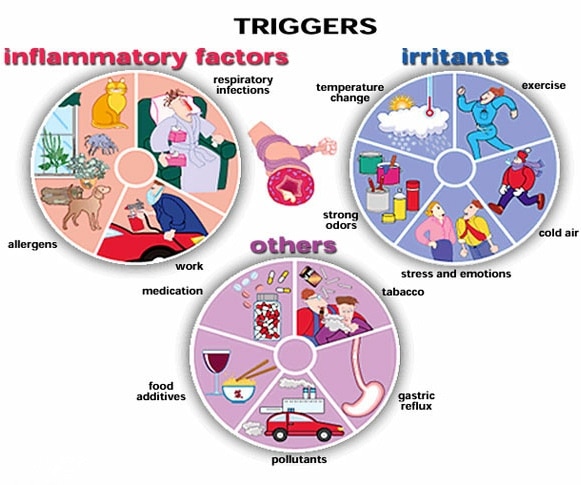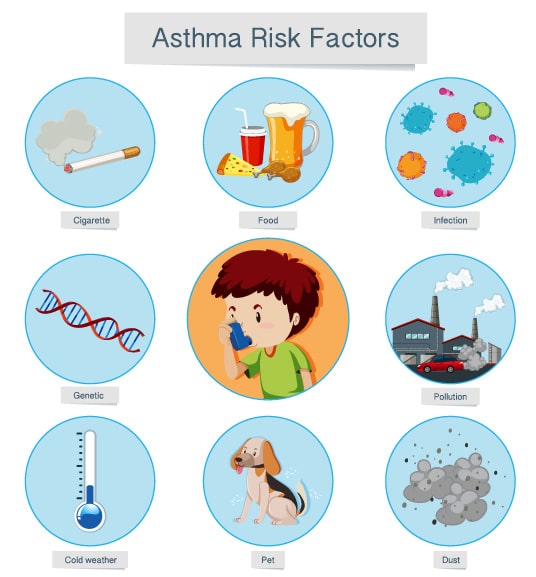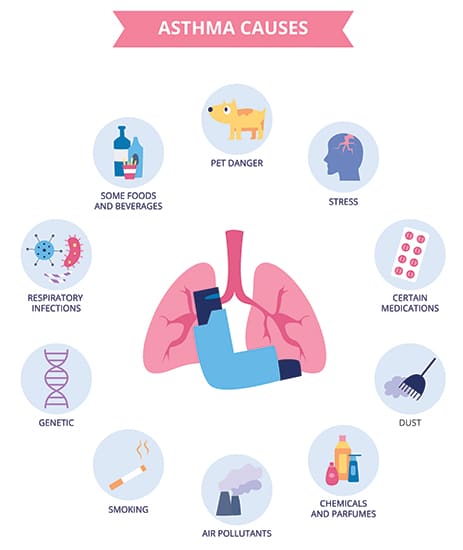What Is An Asthma Attack
An asthma attack is the episode in which bands of muscle around the airways are triggered to tighten. This tightening is called bronchospasm. During the attack, the lining of the airways becomes swollen or inflamed, and the cells lining the airways make more and thicker mucus than normal.
All of these things — bronchospasm, inflammation, and mucus production — cause symptoms such as trouble breathing, wheezing, coughing, shortness of breath, and trouble with normal daily activities.
Other symptoms of an asthma attack include:
- Severe wheezing when breathing both in and out
- Coughing that won’t stop
- Feelings of anxiety or panic
- Pale, sweaty face
- Blue lips or fingernails
An asthma attack can get worse quickly, so it’s important to treat these symptoms right away.
Without immediate treatment, such as with your asthma inhaler or bronchodilator, it will become harder to breathe. If you use a peak flow meter at this time, the reading will probably be less than 50% of your usual or normal peak flow reading.. Many asthma action plans suggest interventions starting at 80% of normal.
As your lungs continue to tighten, you wonât be able to use the peak flow meter at all. Your lungs will tighten so there is not enough air movement to make wheezing. You need to go to a hospital right away. Unfortunately, some people think that the disappearance of wheezing is a sign of improvement and donât get emergency care.
Breathing: Normal Airways Vs Asthma Airways
Normal: In someone with optimal lung function, air is inhaled through the nose and mouth, passing through the trachea before moving into the bronchi . The bronchi branch into smaller tubes, ending in many small sacs called alveoli. Its in the alveoli that oxygen is passed to the blood and carbon dioxide is removed.
Asthma: In someone with asthma, the airways are inflamed, and when triggered, can constrict even more, obstructing airflow to the lungs.
Diagnosing Asthma In A Young Child Can Be More Challenging Because:
- Children under six years of age are not generally able to do a lung function test
- Symptoms such as cough and wheeze are fairly common in very young children who do not have asthma
However, a diagnosis of asthma can be made in a young child. Your health-care provider will assess:
- What symptoms does the child have?
- When do the symptoms occur ?
- Is there a history of allergies or asthma in the family?
- Does the child have any signs of allergies
- Do the symptoms improve when taking asthma medications?
For more information please Call us at Monday to Friday between 8:30am-4:30pm or email us your question anytime at
Medications are usually needed for asthma, even if its mild asthma. New asthma medications are continually being discovered and there are several effective asthma drugs in the market that help get asthma under control.
There are two types of asthma medications: controllers and relievers.
Don’t Miss: How To Exercise With Asthma
How Is Asthma Treated
Asthma can be controlled, but there’s no asthma cure. There are, however, certain goals in asthma treatment. If you are unable to achieve all of these goals, it means your asthma is not under control. You should contact your asthma care provider for help with asthma.
Treatment goals include the following:
- Live an active, normal life
- Prevent chronic and troublesome symptoms
- Attend work or school every day
- Perform daily activities without difficulty
- Stop urgent visits to the doctor, emergency room, or hospital
- Use and adjust medications to control asthma with little or no side effects
Properly using asthma medication, as prescribed by your doctor, is the basis of good asthma control, in addition to avoiding triggers and monitoring daily asthma symptoms. There are two main types of asthma medications:
Asthma medications can be taken by inhaling the medications or by swallowing oral medications . If you are also taking drugs for other conditions, you should work with your providers to check drug interactions and simplify medications when possible.
How Is Airway Sensitivity Measured

It is possible to measure how sensitive your airways with a methacholine challenge.3 This test rules out conditions that mimic asthma, such as vocal cord dysfunction and other obstructive lung diseases, such as chronic bronchitis and emphysema. Finding out that you have sensitive airways helps to confirm the diagnosis of asthma.
You May Like: What Medicine Is Good For Asthma Cough
Why Do Some Asthmatics Develop Copd
Researchers are still investigating this area. They are still not sure. But, one theory is the type of inflammation involved. Most asthmatics have inflammation caused by white blood cells called eosinophils. So, they have eosinophilic inflammation. This type of inflammation responds well to traditional asthma medicines.
Their asthma responds well to beta 2 adrenergics and corticosteroids. A daily dose of medicines like Advair or Symbicort help them obtain good asthma control.
When these medicines dont work, they may be diagnosed with Severe Asthma. The cause may be a different type of inflammation, such as neutrophilic inflammation. This is similar to the type of inflammation seen in COPD airways.
Plus, Severe Asthmatics may have airway scarring. Inflammation can cause damage to airway tissues. Tissues then become scarred. This scar tissue makes airway walls thicker. This also is similar to what happens with COPD.
Thicker walls make airways abnormally narrow. There is no medicine for treating this. And this may cause persistent airflow limitation. When this happens, a diagnosis of COPD can be made. It may result in a diagnosis of Asthma/ COPD Overlap Syndrome.
Why Does My 2 Year Old Sulk All The Time
Pouting, whining, and sulking are three of the most annoying ways that kids communicate their displeasure, anger, or frustration with a situation. This behavior is not just limited to young children, eitherteens do it because they havent always learned the skills to express their frustration in an appropriate way.
Also Check: Florida Center Allergy And Asthma Care
About Chemical Irritants And Asthma
Chemical irritants are found in some products in your house and may trigger asthma. Your asthma or your child’s asthma may be worse around products such as cleaners, paints, adhesives, pesticides, cosmetics or air fresheners. Chemical irritants are also present in schools and can be found in commonly used cleaning supplies and educational kits.
Chemical irritants may exacerbate asthma. At sufficient concentrations in the air, many products can trigger a reaction.
Asthma Management At Any Age
Its essential to adjust your asthma management plan for different stages of your life. At any age, the key to treating asthma is to have a comprehensive action plan that includes these basic components:
- Measurement tools to monitor your asthma.
- Fast-acting and control medications.
- Identification of your triggers and a plan to reduce exposure.
- Emergency care when needed.
Recommended Reading: How To Improve Asthma Naturally
Asthma Patterns In Children
Every childs asthma is different. Some children have mild, occasional episodes of asthma or only show symptoms after exercising, or when they have a cold. Some experience daily symptoms, while others have symptoms continuously, which limit their level of activity.
Each pattern of asthma requires a different treatment approach. It is important to remember that children can still have a severe and even life-threatening attack, even if they generally have mild or occasional asthma.
How Asthma Is Treated
While there is no cure for asthma, there are a number of treatments that can help control the condition.
Treatment is based on two important goals, which are:
- relieving symptoms
- preventing future symptoms and attacks
For most people, this will involve the occasional or, more commonly, daily use of medications, usually taken using an inhaler. However, identifying and avoiding possible triggers is also important.
You should have a personal asthma action plan agreed with your doctor or nurse that includes information about the medicines you need to take, how to recognise when your symptoms are getting worse, and what steps to take when they do so.
These symptoms are often worse at night and early in the morning, particularly if the condition is not well controlled. They may also develop or become worse in response to a certain trigger, such as exercise or exposure to an allergen.
Read our page on the causes of asthma for more information about potential triggers.
Speak to your GP if you think you or your child may have asthma. You should also talk to your doctor or asthma nurse if you have been diagnosed with asthma and you are finding it difficult to control the symptoms.
Also Check: What Does A Nebulizer Do For Asthma
Also Check: Ways To Improve Your Asthma
Symptoms Of Asthma Emergencies In Children
The signs of an asthma emergency include when the child:
- finds it very difficult to breathe or is not breathing
- is unable to speak comfortably or complete sentences without losing breath
- has lips turn blue
- has symptoms that get worse very quickly
- has tugging in of the skin between ribs or at the base of the neck
- is getting little or no relief from their reliever inhaler, or their reliever inhaler is not available.
Everyday Treatment For Asthma In Children

The main aims of day-to-day asthma treatment are to:
- keep symptoms under control
- keep lungs as healthy as possible
- stop asthma from interfering with school or play
- help your child enjoy a full and active life.
Your doctor will help you to develop a plan to manage your childs asthma which will include an asthma action plan , and will prescribe the correct medication to help you do so.
You May Like: How To Stop Cough Variant Asthma
What Are The Symptoms Of Asthma
While symptoms vary from person to person, the most common signs of mild asthma include:
- difficulty breathing feeling breathless, even while resting, or being unable to finish full sentences before needing to take another breath
- wheezing making a whistling sound while breathing
- coughing either at specific times or after certain activities
During a severe asthma attack, you may notice more serious symptoms, such as:
- feeling very distressed, exhausted or even limp from trying to breathe
- deep sucking motions at the throat or chest while trying to breathe
Treatment And Medication Options For Asthma
There is no cure for asthma, but you can alleviate and prevent your symptoms through quick-relief and long-term control medication. Long-term control medication works to reduce inflammation to make your airways less sensitive to asthma triggers. Its usually taken daily through an inhaler or as an oral pill. Quick-relief medicines help to relieve symptoms when they happen, relaxing the tight muscles around your airways and easing the flow of air.
Also Check: How To Use Kalonji For Asthma
Can Babies Have Asthma
See Related Pages
We dont always know why a baby develops asthma but some causes can be:
- Family history of asthma, allergies or eczema
- Premature birth
- A viral infection , especially when the baby is less than 6 months old
- A mother who smokes during pregnancy
As many as 80% of children that will have asthma develop signs and symptoms before the age of 5.
About Secondhand Smoke And Asthma
Secondhand smoke is the smoke from a cigarette, cigar, or pipe, that is exhaled by a smoker. Secondhand smoke contains more than 4,000 substances, including several compounds that cause cancer.
Secondhand smoke can trigger asthma episodes and increase the severity of attacks. Secondhand smoke is also a risk factor for new cases of asthma in pre-school-aged children. Children’s developing bodies may make them more susceptible to the effects of secondhand smoke. Due to their small size, they breathe more rapidly than adults, thereby taking in more secondhand smoke. Children receiving high doses of secondhand smoke, such as those with smoking parents, run the greatest relative risk of experiencing damaging health effects.
You May Like: Is Asthma Related To Copd
What Makes A Child More Likely To Develop Asthma
There are many risk factors for developing childhood asthma. These include:
- Family history of asthma, allergies and atopy .
- Frequent respiratory infections.
- Being African American.
- Being raised in a low-income environment.
In children who are under five years of age, the most common cause of asthma symptoms is upper respiratory viral infections such as the common cold.
You May Like: How Long Does It Take To Die From Asthma Attack
What Causes Asthma In Children
The exact cause of asthma is unknown. Genetics and environment likely play a role in which children get asthma.
An asthma attack can happen when your child is exposed to an asthma trigger. An asthma trigger is something that can set off or worsen asthma symptoms. Different triggers can cause different types of asthma:
- Allergic asthma is caused by allergens. Allergens are substances that cause an allergic reaction. They can include
Asthma triggers may be different for each child and can change over time.
Also Check: How To Check For Asthma In Adults
What Are Signs And Symptoms Of Adult Onset Asthma
Regardless of age, asthma symptoms can include:
Dry cough, especially at night or in response to specific triggers
Tightness or pressure in the chest
Wheezing a whistling sound when exhaling
Shortness of breath after exercise or physical exertion
Difficulty breathing
Colds that go to the chest or hang on for 10 days or more
Create An Asthma Action Plan

The American Lung Association recommends creating an asthma action plan to outline what type of medication you should take and when. It should also provide details about what to do if your asthma is dangerously out of control. These instructions will help you, friends, and relatives know when its time to change treatments or seek emergency care.
To make this plan:
- Discuss treatment options with your doctor.
- Plan what you should do in the event of an asthma flare-up.
- List what triggers can be avoided and the best ways to avoid them.
- Define at what point you need to increase treatment measures to prevent or reduce the severity of an attack.
Also Check: Is Olbas Oil Good For Asthma
Side Effects Of Relievers And Preventers
Relievers are a safe and effective medicine, and have few side effects as long as they are not used too much. The main side effects include a mild shaking of the hands , headaches and muscle cramps. These usually only happen with high doses of reliever inhaler and usually only last for a few minutes.
Preventers are very safe at usual doses, although they can cause a range of side effects at high doses, especially with long-term use.
The main side effect of preventer inhalers is a fungal infection of the mouth or throat . You may also develop a hoarse voice and sore throat.
Using a spacer can help prevent these side effects, as can rinsing your mouth or cleaning your teeth after using your preventer inhaler.
Your doctor or nurse will discuss with you the need to balance control of your asthma with the risk of side effects, and how to keep side effects to a minimum.
How To Tell If You Have Asthma
When something triggers your asthma symptoms, the membrane lining your airways swells, the muscles around the tubes constrict, and the airways fill with mucus. As these tubes narrow it becomes more difficult to breathe, causing symptoms such as wheezing and coughing, congestion, shortness of breath, and chest tightness or pain. If you have asthma, performing normal daily activities can be strenuous, and it may take longer to recover from a respiratory infection, such as a cold or flu.
An asthma attack or flare-up is a sudden worsening of these symptoms, including severe wheezing, uncontrollable coughing, rapid breathing, sweating, and anxiety. These symptoms require immediate medical attention.
But not everyone experiences asthma in the same way. Symptoms vary from person to person, can change with age, differ between attacks and may intensify during exercise, with a cold, or under periods of elevated stress.
Also Check: How Does Asthma Impact The Respiratory System
How To Tell If Your Asthma Is Severe
Doctors differentiate severe asthma from other, milder forms of asthma according to the frequency and intensity of a persons symptoms.
For starters, severe asthma is persistent, which doctors define as asthma that causes symptoms more than twice a week, explains Patricia Takach, MD, an associate professor of clinical medicine in the section of allergy and immunology at the University of Pennsylvanias Perelman School of Medicine in Philadelphia. For many severe asthma sufferers, symptoms occur daily.
Personal Asthma Action Plan
As part of your initial assessment, you should be encouraged to draw up a personal asthma action plan with your GP or asthma nurse.
If youve been admitted to hospital because of an asthma attack, you should be offered an action plan before you go home.
The action plan should include information about your asthma medicines, and will help you recognise when your symptoms are getting worse and what steps to take. You should also be given information about what to do if you have an asthma attack.
Your personal asthma action plan should be reviewed with your GP or asthma nurse at least once a year, or more frequently if your symptoms are severe.
As part of your asthma plan, you may be given a peak flow meter. This will give you another way of monitoring your asthma, rather than relying only on symptoms, so you can recognise deterioration earlier and take appropriate steps.
Want to know more?
Dont Miss: Asthma Attack Recovery Time
Read Also: Allergy And Asthma York Pa
